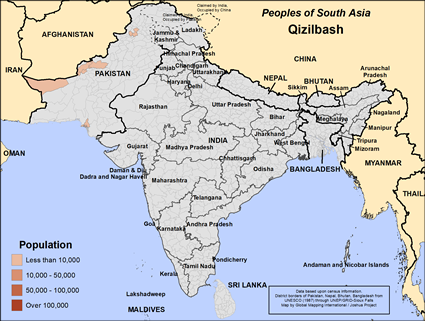Qazilbash in Pakistan

Photo Source:
Anonymous
|

Map Source:
People Group data: Omid. Map geography: UNESCO / GMI. Map Design: Joshua Project
|
| People Name: | Qazilbash |
| Country: | Pakistan |
| 10/40 Window: | Yes |
| Population: | 5,400 |
| World Population: | 342,400 |
| Primary Language: | Dari |
| Primary Religion: | Islam |
| Christian Adherents: | 0.00 % |
| Evangelicals: | 0.00 % |
| Scripture: | Complete Bible |
| Ministry Resources: | Yes |
| Jesus Film: | Yes |
| Audio Recordings: | Yes |
| People Cluster: | Turkish |
| Affinity Bloc: | Turkic Peoples |
| Progress Level: |
|
Introduction / History
The Qizilbash are bilingual Persian and Turkic-speaking Azerbaijani background, united in their belief in Twelver Shia Islam. In Afghanistan they live in urban areas such as Kabul, Herat, Logar, Kandahar or Mazar, as well as in certain villages in central Afghanistan. They are descendants of the troops left behind by Nadir Shah Afshar during his "Indian campaign" in 1738.
Qizilbash are Azeri Turks tribes mainly from Anatolia and Azerbaijan. The main difference between Qizilbash Oghuz tribes and other Turkic people is that they are Shia Turkic people. Therefore, the name Qizilbash is usually applied to them only. Some of these tribes in Afghanistan were subdivided in clans included the Afshar, Bayat, Shahseven, Ansarlu, Shaaghasi, Shamlu and Javanshir or Jawansher.
Bayat clan: Bayat is the name of an originally Turkic clan in Iran which traces its origin to the 12th century. The first location of the Bayat clan was the city of Nishapur in the south of Khorasan, a state in northeastern Iran. The Bayat clan moved in the 16th century to three locations after attacks by Mongol forces. The Bayat clan made war with the Mongols, killing Genghis Khan's son-in-law with his army. Then Khan attacked Nishapur with all his forces, killing many Bayat clansmen, and the rest of the Bayat clan escaped to the mountains around Nishapur.
Bayat was the name of one the 24 Oghuz Turkish clans purported to descend from Oghuz Khaqan according to Oghuzname and the oral legends prior to that book's writing in early 14th century. In Afghanistan, the clan is known to have included those who originally immigrated into the country with Nader Shah Afshar. Bayat is a common surname today in Afghanistan, Iran, and Azerbaijan and to a lesser extent in Turkey and Turkmenistan where it carries the meaning "Knight" or "Chevalier".
Ansarlu clan: Ansarlu or Ansaroglu are Azerbaijani Turkish tribe and a part of Qizilbash people in Afghanistan. It is a branch of Bayat clan. The name of one Oghuz Turkish clans purported to descend from Oghuz Khaqan. They are living in Kala Fatullah, Kala sadulah Wazirabad village in Kabul. In Afghanistan the clan is known to have included those who originally immigrated into the country with Nader Shah Afshar.
Afshar clan: Afshars are a branch of the Turkic Oghuz groups. These originally nomadic Oghuz tribes moved from Central Asia through Iran and finally most settled in Anatolia (Turkey).
The Afshar tribes of Iran are two distinct Turkic-speaking ethnic groups. The larger group is concentrated in the north of the country, and the smaller in the south. The Turkic dialect spoken by the Afshar of the north is closely related to the Azeri language, while the dialect spoken by the southern Afshar is more closely related to the Qashqai language. Many Afshari are living in Iran, Turkey and Afghanistan.
Shamlu clan: The Shamlu Tribe is one of the 7 original and the most powerful Qizilbash tribe of Turkoman origin in Iran. In Afghanistan they are mainly living in Kabul and Herat.
Shahsevan and Shah Aghasi clans: They are a branch of the Turkic Oghuz groups located primarily in Iran and in the territory of the present-day Republic of Azerbaijan and Afghanistan. In Iran, they are mainly living in Qom, Tehran, Qazvin and Zanjan. In Afghanistan they are mainly living in Kabul. The name shahsevan means adherents of the king.
What Are Their Lives Like?
Afghanistan's Qizilbash have always held important posts in government offices; today they engage in trade or are craftsmen. They constitute an important and politically influential element of Afghan society.
What Are Their Beliefs?
The Qizilbash adhered to multiple Shia doctrines encouraged by early Safawiyyah sheikhs, specifically sheikh Haydar and his son, Isma'il. They regarded their rulers as divine figures and would thus be classified as ghulat extremist by orthodox Ithnaashari Shias.
What Are Their Needs?
As far as we know, there is not a single Christ follower among the Muslim Qizilbash people in Afghanistan. They live in a country where the government hunts down Christians, and they do all they can to prevent gospel materials from being available. God needs to reach them through a miracle.
Prayer Points
Pray for a clear presentation of the gospel message among the Qizilbash in both Afghanistan and Pakistan.
Pray that God will raise up laborers who are willing to reach the Qizilbash for Christ, no matter what the cost.
Pray that strong local churches will be planted among the Qizilbash people.
Pray for Qizilbash disciples who will make more disciples.